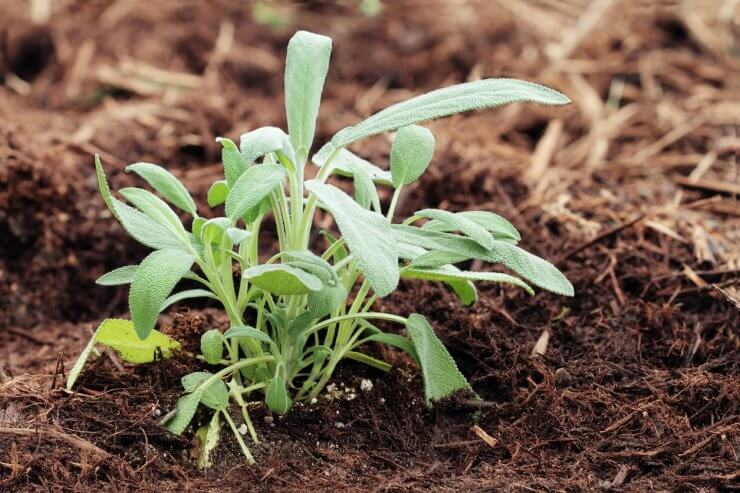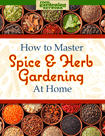
There’s nothing like the fragrance of fresh herbs in the kitchen. I love the way they flavor a meal and add color to sauces. And I love how easy they are to grow. You can grow herbs like basil in a sunny windowsill, rosemary will stay fresh outdoors well into the colder months of the year, and I’m pretty sure mint would even grow on the moon. But can you help your herbs grow even better and stronger? Should you use mulch for an herb garden?
Mulch has a lot of benefits in a vegetable garden. It helps retain moisture, or in some cases, promotes drainage, and it helps control soil temperatures and inhibit weeds. But herbs are a bit different than vegetables.
Find out how easy growing spices and herbs can be—indoors or out! Read our FREEBIE How to Master Spice and Herb Gardening at Home right now!
Why some gardeners use mulch for an herb garden (and why you may want to, as well)
Herbs are generally easygoing garden delights. Many of them deter pests, making them ideal companion plants, and they don’t require very much of you as a gardener. For this reason, a lot of gardeners don’t use mulch for an herb garden. However, early season plants, like garlic or chives, may start coming in during a warm spell. A layer of mulch can help insulate them against drops in temperature. And some mulches, like shredded leaves or compost, will add nutrients to the soil as they decompose.
Mulch also helps prevent weeds, which can easily take over your herbs and steal nutrients from them. As an extra bonus, organic mulch and compost can also encourage earthworm activity. Earthworms help aerate the soil as they dig, some worms will eat nematodes, and earthworm castings (aka worm poop) are highly nutritious for soil.
The best mulch for an herb garden is…
Okay, there really are a variety of “best” mulches. I’m of the opinion that whatever is free is best, but if you want a certain look for your garden or if you have allergies, you may want to look into buying mulch. Whatever you choose, I’d recommend sticking with organic mulch because, well, this is your food we’re talking about.
- Yard waste. Yard waste, like grass clippings and shredded leaves, makes great mulch. It’s natural and full of nutrients your herbs can use, and for many of us, it solves the problem of what to do with all those leaves we rake up in the fall. You can dig these into the soil or leave it on top as a blanket, depending on where you are in your gardening progress. Just be aware that too much mulch of this kind can tip you from keeping the soil healthy into soil that’s too wet and even soggy.
- Compost. Like yard waste, compost is natural and can help improve your soil health. If you have an indoor compost bin or outdoor compost heap, you already have this resource, so take advantage of it.
- Wood chips. Wood chips aren’t for everybody. Unless you have a wood chipper, you’ll need to buy wood chips or rent a chipper. And, of course, you’ll need a fair amount of wood. This is great if you have a fallen tree in your yard. If you do opt to buy wood chips, be careful, as some of the wood may come for various commercial waste sources and could be contaminated with industrial chemicals.
- Straw or hay. This may be a stretch to use as mulch for an herb garden, and for most of us, it’s not free. But if you have access to straw, it’s a great mulch, and a lot of organic commercial farms use it for their crops.
- Gravel. This may not be the first thing you think of as mulch, but herbs like rosemary that come from Mediterranean climates love the drainage and the heat that gravel offers. And since gravel isn’t going to decompose, it’s a good choice if your herb garden is also part of your landscape design.
There are always more options for mulch, but these five are easy to come by, and if not free, they’re at least inexpensive. The nice thing is that herbs can be pretty forgiving, so even if you don’t get it “right” on the first try, you can try again with another material later on.
Do you use mulch for an herb garden in your yard? I’d love to know what you use and how it works. Share your ideas in the comments.
Find out how easy growing spices and herbs can be—indoors or out! Read our FREEBIE How to Master Spice and Herb Gardening at Home right now!





Family discarded my paper egg cartons. I quit buying herbs. They started saving cartons, tasted herbs, & scavenge “hood” for cartons. We upcycle for herb growth.
If you use grass clippings to mulch with, make certain they are dry! Green clippings can compost and produce a lot of heat which can cook your plants……. ask me how I know
Mulching is particularly beneficial to those grown in containers. I live in a condo and grow herbs on my deck…mulch keeps them beautiful during the hot summer months.
Yes it also keep the grass and weeds from growing!